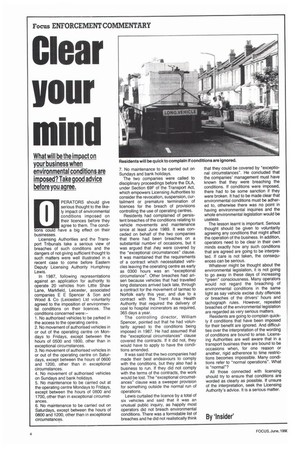Clear your mind
Page 6

If you've noticed an error in this article please click here to report it so we can fix it.
What will be the impact on your business when environmental conditions are imposed? Take good advice before you agree.
PERATORS should give serious thought to the likely impact of environmental conditions imposed on their licences before they agree to them. The conditions could have a big effect on their businesses.
Licensing Authorities and the Transport Tribunals take a serious view of breaches of such conditions and the dangers of not giving sufficient thought to such matters were well illustrated in a recent case to come before Eastern Deputy Licensing Authority Humphrey Lewis.
In 1987, following representations against an application for authority to operate 20 vehicles from Little Shaw Lane, Markfield, Leicester, associated companies E E Spencer & Son and Wood & Co (Leicester) Ltd voluntarily agreed to the imposition of environmental conditions on their licences. The conditions concerned were: 1 No authorised vehicles to be parked in the access to the operating centre.
2. No movement of authorised vehicles in or out of the operating centre on Mondays to Fridays, except between the hours of 0500 and 1800, other than in exceptional circumstances.
3. No movement of authorised vehicles in or out of the operating centre on Saturdays, except between the hours of 0600 and 1200, other than in exceptional circumstances.
4. No movement of authorised vehicles on Sundays and bank holidays.
5. No maintenance to be carried out at the operating centre Mondays to Fridays, except between the hours of 0800 and 1700, other than in exceptional circumstances.
6. No maintenance to be carried out on Saturdays, except between the hours of 0800 and 1200, other than in exceptional circumstances. 7. No maintenance to be carried out on Sundays and bank holidays.
The two companies were called to disciplinary proceedings before the DLA, under Section 69F of the Transport Act, which empowers Licensing Authorities to consider the revocation, suspension, curtailment or premature termination of licences for the breach of provisions controlling the use of operating centres.
Residents had complained of persistent breaches of the conditions relating to vehicle movements and maintenance since at least June 1989. It was conceded on behalf of the two companies that there had been breaches on a substantial number of occasions, but it was argued that they were covered by the "exceptional circumstances" clause. It was maintained that the requirements of a contract which necessitated vehicles leaving the operating centre as early as 0300 hours was an "exceptional circumstance". Other breaches had arisen because vehicles that had travelled long distances arrived back late, through a contract for the movement of tarmac to Norfolk early this year, and due to a contract with the Trent Area Health Authority that required the delivery of coal to hospital incinerators as required, 365 days a year.
The controlling director, William Spencer, pointed out that he had voluntarily agreed to the conditions being imposed in 1987_ He had assumed that the "exceptional circumstances" clause covered the contracts. If it did not, they would have to apply to have the conditions amended.
It was said that the two companies had made their best endeavours to comply with the conditions, but they also had a business to run. If they did not comply with the terms of the contracts, the work would be lost. The "exceptional circumstances" clause was a sweeper provision for something outside the normal run of operations.
Lewis curtailed the licence by a total of six vehicles and said that it was an unusual public inquiry, as happily most operators did not breach environmental conditions. There was a formidable list of breaches and he did not realistically think that they could be covered by "exceptional circumstances". He concluded that the companies' management must have known that they were breaching the conditions. If conditions were imposed. there had to be some sanction if they were broken. It had to be made clear that environmental conditions must be adhered to. otherwise there was no point in having environmental inquiries and the whole environmental legislation would be useless.
The lesson learnt is important. Serious thought should be given to voluntarily agreeing any conditions that might affect the operation of the business. In addition, operators need to be clear in their own minds exactly how any such conditions that are agreed are going to be interpreted. If care is not taken, the consequences can be serious.
Whatever might be thought about the environmental legislation, it is not going to go away in these days of increasing "green" consciousness. Many operators would not regard the breaching of environmental conditions in the same light as say vehicle excise duty offences or breaches of the drivers' hours and tachograph rules. However, repeated breaches of the environmental legislation are regarded as very serious matters.
Residents are going to complain quickly if conditions that have been imposed for their benefit are ignored. And difficulties over the interpretation of the wording of conditions are bound to arise. Licensing Authorities are well aware that in a transport business there are bound to be occasions when, for one reason or another, rigid adherence to time restrictions becomes impossible. Many conditions refer to "normal operations". What is "normal"?
All those connected with licensing should try to ensure that conditions are worded as clearly as possible. It unsure of the interpretation, seek the Licensing Authority's advice. Ills a serious matter.
By 'Insider'




















































































































